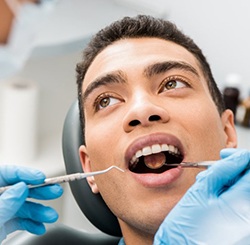Oral Pathology – Marietta, OH
Keeping Your Mouth & Smile Disease-Free
 On average, one person dies from oral cancer every hour, and half of patients won’t go on to survive five years past their original diagnosis. This disease is destructive on its own, but what adds to high numbers is that most cases aren’t diagnosed until they reach advanced stages. If oral cancer is caught early on, there’s a high rate of successful treatment. Here at Muskingum Valley Oral Surgery, Dr. Jeff Lee and his team are dedicated to locating this condition as soon as possible through oral screening and minor soft and hard tissue biopsies.
On average, one person dies from oral cancer every hour, and half of patients won’t go on to survive five years past their original diagnosis. This disease is destructive on its own, but what adds to high numbers is that most cases aren’t diagnosed until they reach advanced stages. If oral cancer is caught early on, there’s a high rate of successful treatment. Here at Muskingum Valley Oral Surgery, Dr. Jeff Lee and his team are dedicated to locating this condition as soon as possible through oral screening and minor soft and hard tissue biopsies.
Oral cancer is an incredibly destructive disease that affects millions of people every year. Unfortunately, the factor that adds to these high numbers is that most cases aren’t diagnosed until they’ve reached advanced stages. If oral cancer is caught early on, there’s a higher rate of successful treatment. At Muskingum Valley Oral Surgery, Dr. Jeff Lee and his team are dedicated to locating this condition as soon as possible through oral screenings and minor soft and hard tissue biopsies.
Why Choose Muskingum Valley Oral Surgery for Oral Pathology?
- Offers Personalized & Effective Treatment Plans
- Sedation Dentistry Available for Patient Comfort
- Welcomes Insurance & Accepts Financing
What is Oral Pathology?

Oral pathology is a certain branch of oral care that checks for and addresses diseases that can impact the mouth and nearby structures, such as the teeth, tongue, gums, and other soft tissues, including your salivary glands. While periodontal disease and tooth decay are some of the more common oral health problems that arise, various other conditions can negatively influence the rest of your mouth, such as thrush, candidiasis, the herpes simplex virus, black hairy tongue, and oral cancer.
How We Detect Oral Problems

When your mouth is healthy, the inside should be smooth and thoroughly pink. Changes that indicate oral cancer can be found within the mouth or on the lips, cheeks, tongue, or face. Pain is surprisingly not a common indicator. That’s why it’s strongly recommended that patients perform a self-examination every month to identify potentially suspicious areas. These could include:
- Oral sores that bleed and/or are slow to heal
- Sore throat or hoarseness in the voice that’s become commonplace
- Constant difficulty when it comes to chewing and swallowing food
- A red or white patch forming on the inside of the mouth
- A lump, crust, or thickened area forming on the inside of the mouth
Dr. Lee also performs in-depth visual examinations of oral structures to locate any tell-tale signs of oral cancer. If our team locates a suspicious growth, our next step is to collect a small specimen of the potentially cancerous oral tissue. This process is called a biopsy. We provide local anesthetic for comfort and can perform the removal in minutes. We then send the sample to a nearby laboratory for testing. Once we’ve received the results, Dr. Lee will discuss them and walk you through the treatments that may be needed.
Benefits of Oral Pathology

With oral pathology, we can actively and effectively detect potential life-threatening issues in your mouth before they can worsen. Your dental checkups will always include an oral cancer screening so that our team can thoroughly evaluate your tongue, gums, and all the surrounding oral tissues to see if they’re free of any patches, lumps, or discoloration—anything that can indicate oral cancer or any other serious conditions. This preventive measure is especially helpful for patients at a higher risk, such as:
- Heavy drinkers
- Tobacco users
- People with excessive sun exposure
- Patients with a family history of oral cancer or other types of oral diseases
